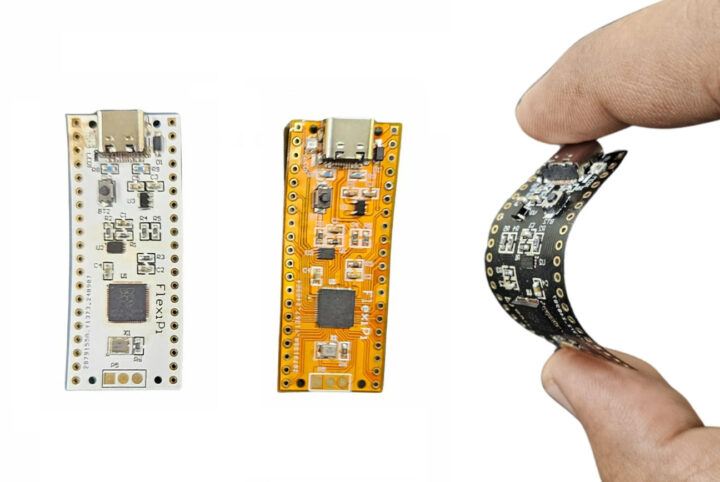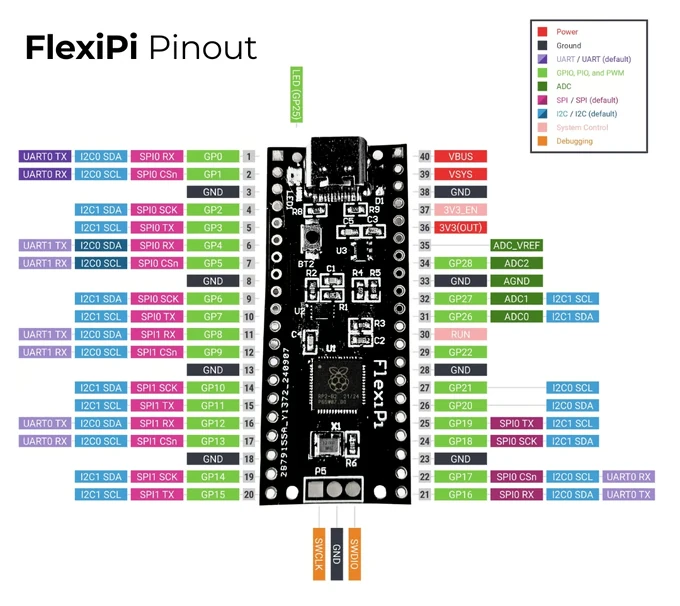[Update December 22: The project was previously called FlexiPi, but Raspberry Pi considered it infringed on its trademarks, so the name was changed to RP2040 FlexiBoard instead].
RP2040 FlexiBoard is a bendable Raspberry Pi RP2040 board made of flexible PCB with the same layout as the original Raspberry Pi Pico, but featuring a USB-C port instead of a micro USB port on the official board.
This follows the Flexduino flex PCB clone of the Arduino UNO made by “EDISON SCIENCE CORNER”, but the smaller design of “TOP Gadgets” RP2040 FlexiBoard may make it potentially more useful since it could be inserted into tight or round enclosures.

RP2040 FlexiBoard specifications:
- MCU – Raspberry Pi RP2040 dual-core Cortex-M0+ microcontroller @ 48 MHz (overclockable to 133 MHz) with 264KB SRAM
- Storage – 2MB QSPI flash
- USB – 1x USB Type-C 1.1 port used for power and programming
- Expansion
- 2x 20-pin 2.54mm pitch header and castellated holes with 26 GPIOs, 3x 12-bit ADC up to 500 Kbps, 2x UART, 2x I2C, 2x SPI, 16x PWM, 2x programmable high-speed I/O
- 3.3V I/O voltage
- Sensor – 12-bit temperature sensor
- Debugging – 3-pin Arm Serial Wire Debug (SWD) port
- Misc
- BOOTSEL button
- WS2812 RGB LED
- RTC
- Power Supply – 5V via USB port or 1.8V to 5V DC via VSYS pin
- Dimensions – 51 x 21mm (thinner, bendable flexible PCB)
Apart from the USB-C port, RGB LED, and flexible PCB, the FlexiPi is the same as the Raspberry Pi Pico. That means it’s software-compatible and you can program it with the Raspberry Pi Pico C/C++ and MicroPython SDKs, Arduino, and any language supported by the Pico.
TOP Gadgets also provides three beginner’s guides for the board for C, MicroPython, and CircuitPyhon. Some of the photos imply those are printed out, but one of the rewards mentions eBooks, so you’d probably only get PDF files instead of physical books.
Making a low-volume flexible PCB comes at a cost, as the RP2040 FlexiBoard sells for five times more than the Raspberry Pi Pico, precisely $20 on Kickstarter. A bundle of 10 boards brings the price down to $18.50 per unit. Shipping is not included and adds an extra $15, so you’d need to pledge $35 to get the board delivered to your door by January 2025.

Jean-Luc started CNX Software in 2010 as a part-time endeavor, before quitting his job as a software engineering manager, and starting to write daily news, and reviews full time later in 2011.
Support CNX Software! Donate via cryptocurrencies, become a Patron on Patreon, or purchase goods on Amazon or Aliexpress





